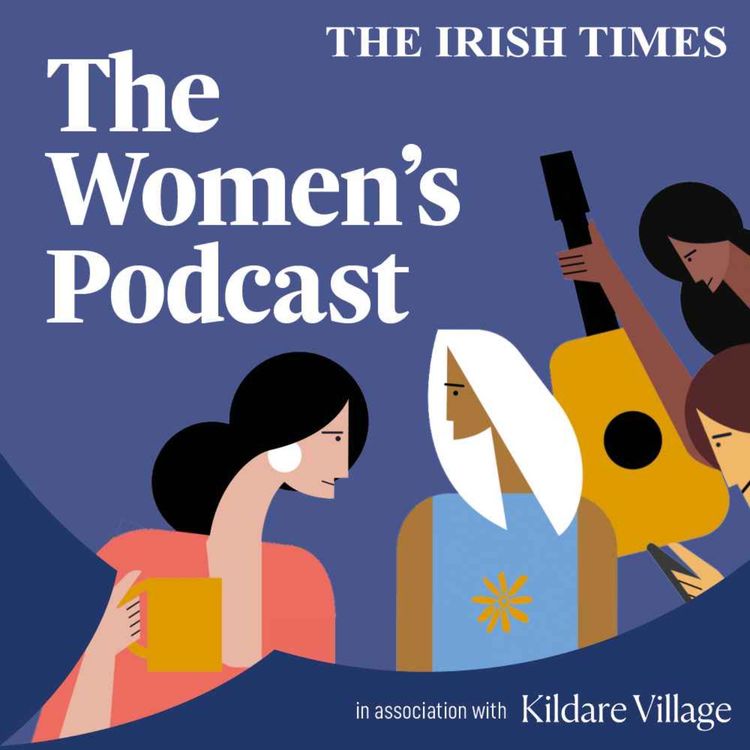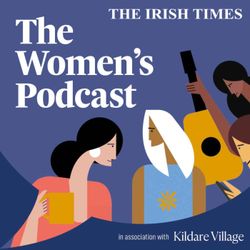Share

The Women's Podcast
Narcissistic mothers: How to handle one and how to heal
•
What does narcissism in mothers look like? According to psychotherapists Helen Villiers and Katie McKenna, the narcissistic mother can be “extremely critical, condescending, oppressive and very judgmental”, with devastating impacts for the entire family. They can also use covert or insidious tactics: taking on a victim role or using guilt tripping or stonewalling to get their way. In this episode, Villiers and McKenna join Róisín Ingle to discuss the main traits of maternal narcissism, how it can impact families and how to heal the emotional scars that come with being a child of narcissistic parents.
Their new book You’re Not the Problem: The impact of narcissism and emotional abuse and how to heal is out now.
More episodes
View all episodes

The women against Iran’s regime
44:59|In late December, merchants and shopkeepers in Iran took to the streets to protest against the dire economic situation in the country. Since then, thousands more Iranians have joined the protests, snowballing it into a much bigger movement which is now calling for the end of the Islamic regime. The authorities have responded to the demonstrations with gunfire, tear gas and thousands of arrests. According to human rights agencies, more than 2000 people have been killed so far in the uprising, with some reports suggesting the death toll could be as high as 12,000. These protests follow on from the 2022 Women, Life, Freedom Movement which saw thousands demonstrate following the death of 22-year-old Mahsa Amini in the custody of the morality police. To understand what is happening on the ground in Iran, and what this latest unrest means for its people and women in particular, Róisín Ingle is joined by two Iranian academics, Mayha Ostovar and Yasaman Ranjbaran. Ostovar is a lecturer at NUI Galway, while Ranjbaran is completing a PHD in ecology and evolution in Padua, Italy. Together, they speak about their hope for a free and peaceful Iran.
AI 'nudification' technology / How Ireland has changed for women
53:48|Over the past thirty years in Ireland, the lives of women have changed unrecognisably. Unparalleled advances in legislation have allowed for divorce, abortion and marriage equality. The economy has gone from boom to bust and to boom again, with more women entering the workplace. But for all the progress, there is still an underrepresentation of women in politics and positions of power, and there’s also a worrying rise in violence against women. This transformation of Irish society and its impact on women is documented by Irish social researcher and author Íde B. O'Carroll in her new book Thirty Years of Change Through Women's Eyes: Ireland, 1993-2023. In today’s episode, the US-based writer tells Róisín Ingle about the women she spoke to for the book and their perspectives on a changing Ireland. But first, Irish Times opinion editor Jennifer O’Connell is here to discuss some of the biggest stories of the week, including the outcome of a harassment case taken by the wife of French President Brigitte Macron and calls to ban AI “nudification” apps.
Suzie Miller: Prima Facie
51:32|Prima Facie, the award-winning one-woman play written by Australian playwright Suzie Miller, is coming to the Gaiety Theatre in Dublin later this month. It follows the story of Tessa Ensler, a highly successful criminal defence lawyer who specialises in sexual assault cases. When Ensler (played by Killing Eve’s Jodie Comer) is sexually assaulted by a colleague, she suddenly finds herself on the other side of the justice system and learns that the law was not written for victims - and that she is the one on trial.In today’s episode, Miller joins Róisín Ingle to discuss the play’s global success, the real-world impact it has had on the court system, and why the story has resonated with so many. She also talks about her background growing up as a working-class girl in Australia, where her love of writing came from and about working with Lena Dunham on upcoming projects.
Domestic Violence, Molly Malone’s breasts, Skortgate & Catherine Connolly: The Women’s Podcast reviews 2025
01:03:35|2025 was the year Ireland elected its third female President, but only three women were appointed Ministers in the new Cabinet. Down one on the previous government. It was the year the hit Netflix show Adolescence had everyone talking about the dangers of the 'manosphere' and toxic masculinity and Australia introduced the world’s first social media ban for children. The year also saw the engagement of pop queen Taylor Swift to her boyfriend Travis Kelce and the relocation of American comedian Rosie O’Donnell and her family to Ireland. Dublin City Council took steps to protect the Molly Malone statue from being groped by tourists and a row over ‘skorts’ caused ructions within the GAA. To look back on this pivotal year and how it impacted the lives of women in Ireland and around the world, Roisin Ingle is joined by Irish Times features writer Nadine O’Regan, opinion editor Jennifer O’Connell and social affairs correspondent Kitty Holland.
The Book Club: Christmas gift recommendations
51:54|If you’re looking for a gift for the book lover in your life, The Women’s Podcast Book Club has you covered. In today’s episode Niamh Towey, Bernice Harrison, Róisín Ingle and Ann Ingle are discussing what books they’ll be giving as gifts this Christmas and the ones they’d like to receive. Their recommendations include a biography for art lovers, a self-help book about setting “healthy boundaries” and a 2020 novel which has just been made into a film starring Paul Mescal and Jessie Buckley. Whether it's a gift for family, friends or even for yourself, we hope there's something for everyone here. But first, Irish Times podcast producer Suzanne Brennan is here to discuss some of the biggest stories of the week including the introduction of a social media ban in Australia for anyone under 16 and a new taxi service coming to Dublin which allows customers to choose a female driver.
The Book Club: Thirst Trap by Gráinne O’Hare
30:36|This month on The Women’s Podcast Book Club, Bernice Harrison, Niamh Towey, Róisín Ingle, and Ann Ingle are discussing Thirst Trap, the debut novel from Belfast writer Gráinne O’Hare. The book tells the story of Harley, Róise, and Maggie, three friends in their late twenties who are living together in a run-down house in Belfast, navigating all that life can throw at them - tricky relationships, heartbreaks and grief. As they approach thirty, the trio must confront past losses and decide whether their friendship can withstand the changes ahead.
Celebrating 10 years of The Women’s Podcast - Highlights from The Peacock Theatre
53:40|Ten years ago, a group of women in The Irish Times got together to envisage a podcast that told stories about the female experience and provided a space for women to share their passions, projects and plights. From there, The Irish Times Women’s Podcast was born. Over the past ten years, the podcast has heard from political leaders, sexual abuse survivors, campaigners, comedians, health professionals, authors, academics, relationship experts and every(woman) in between. Earlier this week, to celebrate a decade of conversation, craic and captivating stories, The Women’s Podcast hosted a live event at the Peacock Theatre in Dublin. On the night, Róisín Ingle and Kathy Sheridan reflected on the most memorable moments from ten years of telling stories - from Waking the Feminists to Repealing the 8th - with contributions from some special guests in the audience. Irish Times opinion editor Jennifer O’Connell was also there on the night to discuss some of the biggest stories of the week. Plus, poet and friend of the show Jan Brierton delivered a gorgeous poem called The Revolution will be Podcast. In today's episode, we're bringing you a selection of highlights from the nights festivities. Enjoy!
Should there be women-only carriages on trains? / Christmas gift ideas
51:41|Although it’s still November, it’s beginning to feel a lot like Christmas over here on The Women’s Podcast. To kick off this year's festive season, we’ve asked three business owners to share their Irish-made gift ideas. Joining Roisin Ingle in studio is illustrator Catherine Geaney, jewellery maker Maureen Lynch and Pat Kane, founder of reuzi, Ireland's one-stop shop for sustainably made, reusable goods. All three are showcasing their work at this year’s Gifted craft fair at the RDS, along with hundreds of other talented makers and producers. In today’s episode, they tell Ingle about what they’ll be bringing to this year's event and what other Irish sellers to look out for. Some of their gift recommendations include Bernie Murphy socks, Conscious Convert bedding and children's toys from The Wonky Wollens.But first, Irish Times opinion editor Jennifer O’Connell is here to discuss some of the biggest stories of the week, including Italy’s new femicide law, the introduction of women-only carriages on french trains and the inquest into the death of teenager Niamh McNally at University Hospital Limerick in 2024.
‘Quiet Piggy’ / Katherine Zappone on life, love and politics
01:14:03|In today’s episode, former senator and government minister Katherine Zappone joins Kathy Sheridan to discuss her new memoir Love in a Time of Politics. In this wide-ranging conversation, Zappone charts her journey through Irish politics, from a fresh-faced senator appointed by then taoiseach Enda Kenny, right through to her tenure as minister for children and youth affairs. She speaks about the campaigns she’s most proud of and the scandals she’d rather forget. The 71-year-old also reflects on her relationship with her beloved wife, Dr Ann Louise Gilligan who died in 2017 and the grief that followed her devastating loss. She tells Sheridan how she eventually found love again with her South African partner Jennifer and what the future now holds for the pair. But first, Irish Times opinion editor Jennifer O’Connell is here to discuss some of the biggest stories of the week, including Trump's unhinged behaviour aboard Air Force One and how and why the global skincare industry is targeting products towards children as young as four.Did you know The Irish Times Women’s Podcast is turning ten years old? To celebrate a decade of conversation, craic and captivating stories, we are hosting our ten year birthday bash at the Peacock Theatre in Dublin on Tuesday, December 2nd. For more information and to get tickets to the event, see here.